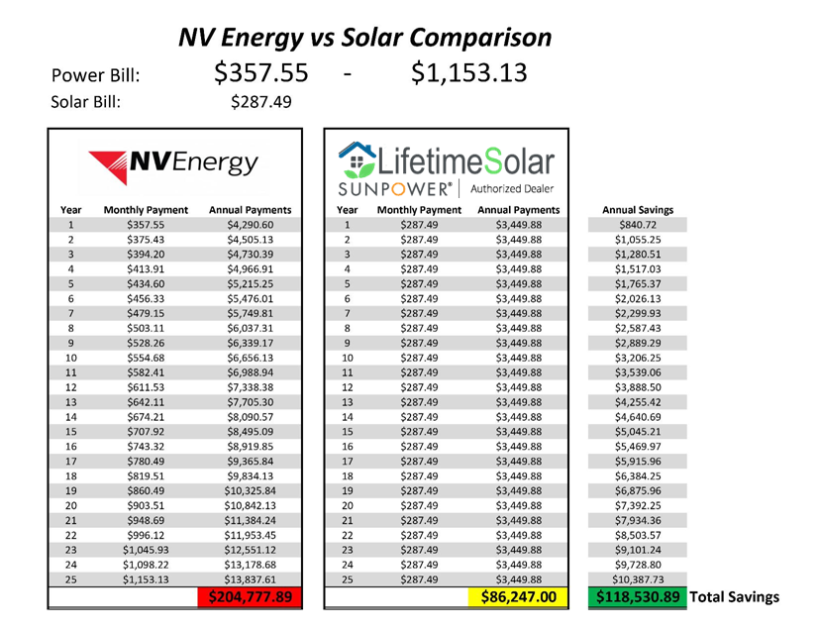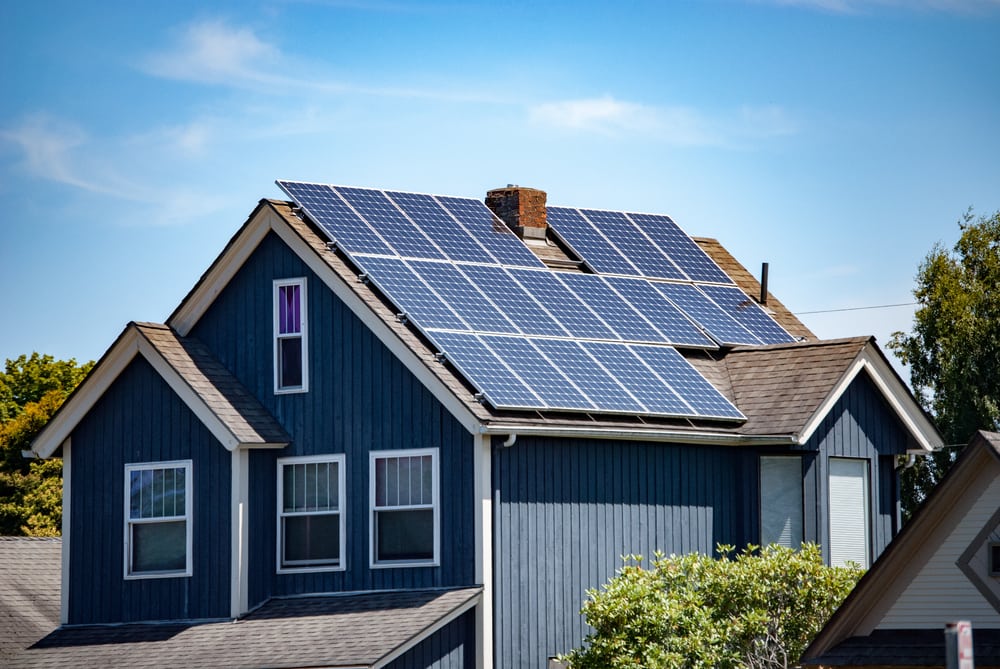Is Solar Power the Right Option for My Home?
The Solar OptionFrequently Asked Questions about Solar Power
How can I eliminate my power bill?
The answer is simple, you "purchase your power instead of rent it." Since the power companies increase by an average of 5% a year, if you don't take the control now, the costs associated become enormous over time. Also there are tax credits available that are declining year to year. So the sooner you make a decision, the better. With a properly designed solar power system that is designed correctly for your specific needs, this is pretty straight forward and can start saving you money immediately. Think about this, you purchase a car for $30,000 you drive it for 5 years trade it in for less than half, then you do it all over again. With Solar Power, you purchase your power once, and that's it. It increases the value of the home ranging from 4 tp 10%, and your power bill ends up disappearing. Now your budget for a new car just paid for itself, make sense? Now there are many variables to consider, so we have outlined all the particulars below to make sure the solar option will work for your needs.
Is solar power a scam?
Solar power itself is not a scam.
It's effectiveness as a renewable energy alternative for your home being supplied power as opposed to from your local power company, is unarguable. As with many industries, where there is money, there are people that will try to take advantage of you. Making sure you have a system that will be sufficient for your consumption needs, payment options (leases should not be considered on a home you intend to stay in), batteries like the Powerwall are generally not needed if power outages are not common. So there are a lot of instances that people can over, or undersell you a system for your home. But the efficacy of solar power is clear, it works and is a clear opportunity to get off the dependency of your local power company. We answer more questions below. Educate yourself so you can make an informed decision.
Is solar power the right option for my home?
By understanding all the variables associated with making the decision below, one can make the decision without much contemplation. In other words, if Solar is the correct option for you, it's a no brainer. Read this page to understand all the ins and outs associated.
Is solar power worth it?
It depends on your consumption needs relative to the cost of acquiring a solar panel system. Even if the cost is even or a little more than your power bill, it is not a bad investment. The reasons is because over time, your power company will raise their rates, but you are no longer a slave to their profit agenda. You have an end game built in if you purchase a system.
Is solar energy worth it?
Well yes of course. If you consumption needs are less than your system can provide, you are going to eliminate your power bill. Otherwise you will just keep paying a power bill the rest of your life.
Is solar a good investment?
There are several factors, but overall yes. Power companies will continue to increase their power rates. Over time, this equates to a large sum of money. To replace it with solar power, your power bill has an end date.
Is solar energy renewable?
Yes, solar power is renewable energy. By definition, the lowest impact to the environment that all other sources.
Is solar energy worth it in Las Vegas?
Yes! Solar power is a highly efficient form of renewable energy. There are several things to consider. One should be aware of their consumption needs. This plays into the cost in getting a solar system that covers 100% of your consumption uses. This will Eliminate your Power Bill...
Your content goes here. Edit or remove this text inline or in the module Content settings. You can also style every aspect of this content in the module Design settings and even apply custom CSS to this text in the module Advanced settings.
There are quite a few frequently asked questions regarding the efficiency and cost of adding solar power to your home. Rather than just give you a straight answer regarding these questions, we feel it’s much better to show you all the variables associated with adding solar power to your home. This page has been created to give you all the tools necessary to make an informed decision.
The best time to purchase a solar system was 20 years ago. The second best time is now!
How can I eliminate my power bill?
The answer is simple, you “purchase your power instead of rent it.” Since the power companies increase by an average of 5% a year, if you don’t take the control now, the costs associated become enormous over time. Also there are tax credits available that are declining year to year. So the sooner you make a decision, the better. With a properly designed solar power system that is designed correctly for your specific needs, this is pretty straight forward and can start saving you money immediately. Think about this, you purchase a car for $30,000 you drive it for 5 years trade it in for less than half, then you do it all over again. With Solar Power, you purchase your power once, and that’s it. It increases the value of the home ranging from 5 to 10%, and your power bill ends up disappearing. Now your budget for a new car just paid for itself, make sense? Now there are many variables to consider, so we have outlined all the particulars below to make sure the solar option will work for your needs.
Is Solar Power the right option for my home?
When deciding if Solar Power is the right option for you, there are many complex variables to consider. Ultimately, if done right, you are simply purchasing your power rather than renting it. What does that mean? It means if your power is being supplied to you by the traditional means, then you are going to see an upward trend on a yearly basis on average of 5%. This may not seem like a lot of money, but it ads up to a large some of money over time. We will illustrate this below.
Laws regarding net metering
Most power companies have adjusted to net metering, however some state laws have been made to reinforce the progressive nature of net metering paving the way to allow solar power to become a legitimate option for your personal or commercial power needs for foreseeable future. It’s important to understand the laws in your area.
What is net metering?
Net metering is the difference between what your solar panels will produce, compared to what is supplied to your home by your local power company. If the system is built to meet your demands, and no large changes are exhibited, than the system’s net power should be at zero.
Do I need a battery like the Tesla Powerwall?
No that is not required. However if you are in an area where there are frequent power outages, you might consider alternate temporary sources for power. Some would include backup batteries or the Tesla Powerwall as stated, or built in generators as an alternative.
Where do you live?
Depending on where you live, the amount of sunlight and orientation of your home and relational to roof space all become relevant parts of the conversation. The ideal environment is the majority of time, you have sunlight and you have sufficient roof space to the south, or with a south orientation for a large part of the day in the Northern Hemisphere. To the North in the Southern Hemisphere.
What if I don’t have enough roof space?
It helps to have an unobstructed roof facing south for the most efficiency in North America. However many system are installed with somewhat facing south orientations. Also, there are other options that include patio covers, gazebos and the like. Just about anything can be done to accomplish your power needs. However, variables may still exist to get to a net zero power consumption. While many options exist, patio covers can have size limitations due to the lot dimensions but is also a good option for additional power to increase the output of new systems, or an add on to existing system. We have patio cover companies to assist if necessary.
What are you power consumption needs?
The larger the family and home, the larger power needs will be required. A current bill would give the details to a solar provider. Getting a solar system based on the amount of power needed, should be designed around 100-110% of your current use. With net metering, this means you no longer have to pay a power bill to your local electric company. Future changes like adding an electric vehicle and the like can be factored in to some degree, but it depends on the policies of your local power company.
Are there differences between the solar panels?
Great question and yes there is a hug difference in the panels and more specifically the cells themselves. Here’s a video showing the differences.
Are there any tax benefits?
Traditionally, there is a one time tax credit/deduction that will be available to you if you qualify ranging from about 22% to 26% of the system cost. Most will apply this credit to further reduce the payment/cost of owning your own power. Currently the tax credit is 26% until 2023. So the sooner you decide, the better.
How much does this average system cost?
On average $20,000 to $40,000 is what you should expect to pay. This is an installed all in price and varies depending on the amount of power required low to high. Obviously large homes with huge demands of power can change this price. Also if you decide to add solar backup batteries to the equation, they run in the neighborhood of $13k each for a Powerwall. While they are nice to have, they are not normally required.
What are my payment options?
– Pay up front
– Finance at a very low rate – (usually around 1.99% based on approval)
– Refinance your home and lump it in
You purchase your power instead of lease it. See illustration below.
How exactly can this eliminate my power bill?
As shown below on a larger home with equal payments at $357/mo, the price will rise year to year ultimately increasing to a very large payment over the term listed below. When you buy solar, you are purchasing your power, so there is an end to the cycle. Furthermore, your payment stays the same. So your solar bill will not rise. As long as the system is designed correctly at a 100% of current power usage, the bill in this case below stays at $287/mo over the same time period. So a small savings of $70/mo isn’t anything to shrug at, but over time you are saving huge amounts of money. If you have ways to pay it early and eliminate the cost completely, that’s even better. This financeable option below is a great way to go and the most common option selected. Just like any loan, the sooner you pay it off the better, but at an average interest of 1.99%, there isn’t a big rush. Many will lump the cost of solar into a refinance as an alternative or just pay out of pocket.


